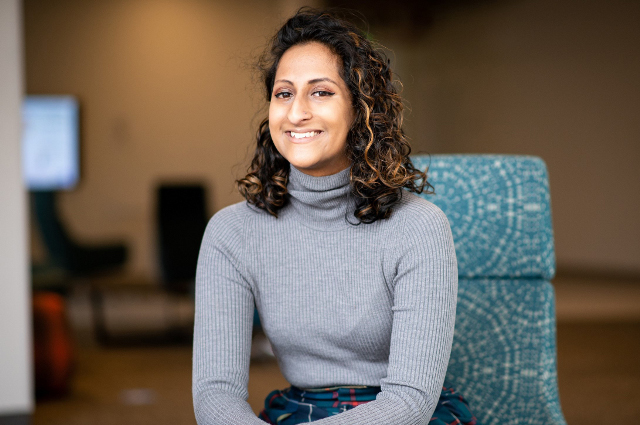Tomorrow's Engineers: Myisha Majumder

Myisha Majumder has been named one of 2021’s 10 New Faces of Civil Engineering (collegiate edition) by the American Society of Civil Engineers. A double major in civil engineering and quantitative economics, she has particular interest in the intersection of the environment, equity, and energy and has worked at the Applied Economics Clinic as a research assistant for more than two years. Last fall, she was editor-in-chief of the Tufts Observer (the first engineering student in the position, she believes), and is also an executive board member for the student-run think tank SYNS, organized through Tisch College of Civic Life.
When I started engineering classes, I fell in love with the idea of thinking about problems and systems, not just at the level of one piece in a puzzle, but as a whole, with the idea of building things that in ways both tangible and intangible that better the world.
That way of thinking is very relevant especially now, when we’re thinking about things like systemic racism more critically. Nothing we do in engineering is really isolated; that’s something that we’ve been taught from day one. Nothing is just moving by itself in one part; it’s connected to a broader system, and we have to think about our place in the world like that, too.
I’m really grateful for how flexible and forward thinking the School of Engineering has been for me. I really appreciate the fact that I was given the opportunities to explore things other than very traditional engineering and to find support.
My advisor in the economics department, Professor Ujjayant Chakravorty, studied civil engineering as an undergrad, so it was cool finding him. And my engineering advisor, Assistant Professor Jonathan Lamontagne, was a political science major before he switched to engineering. So I found my people. They knew where I was coming from.
In the Hidden Figures movie, something that really stuck out to me was Mary Jackson telling her supervisor that she wants to study engineering and the supervisor encouraged her. She really struggled, both due to systemic barriers and personal issues, but she went on. That is emblematic of how I have seen engineering in my time at Tufts.
If professors see something in you that is innate, like the ability to solve problems and to push yourself, they will encourage you to stretch your boundaries so that you can prove that you’re strong and you can tough it out.
The biggest thing is that you have to learn to be resilient and recover from your failures. I don’t think engineering was ever designed to be easy. Failure is often seen as a bad thing, but in my opinion, a lot of the times, it is the only way we can grow.
Over time you realize that failures aren’t as important as what you’re learning. Even the classes that I’ve done the worst in, I’ve learned the most, because I’ve realized just how resilient I am and I can keep going. Overall, that growth mindset is extremely important for engineers.
I’m hoping that there will be more diversity in engineering; that’s something I’ve advocated for and will continue to advocate for as a woman of color. I have definitely grown used to the feeling of being othered. I went to a very predominantly white public school system my entire life, and then came here.
So, it wasn’t necessarily jarring by any means, but amplifying unique voices is really important in engineering. Once we recognize that all voices matter to us as a community, I think we can start to use our unique skills to progress society at a much deeper level than we have so far, and that means incorporating more diverse voices.
This excerpt is from "Who Are Tomorrow’s Engineers? Meet Five with Big Ideas" by Laura Ferguson, Tufts Now.
Department:
Civil and Environmental Engineering